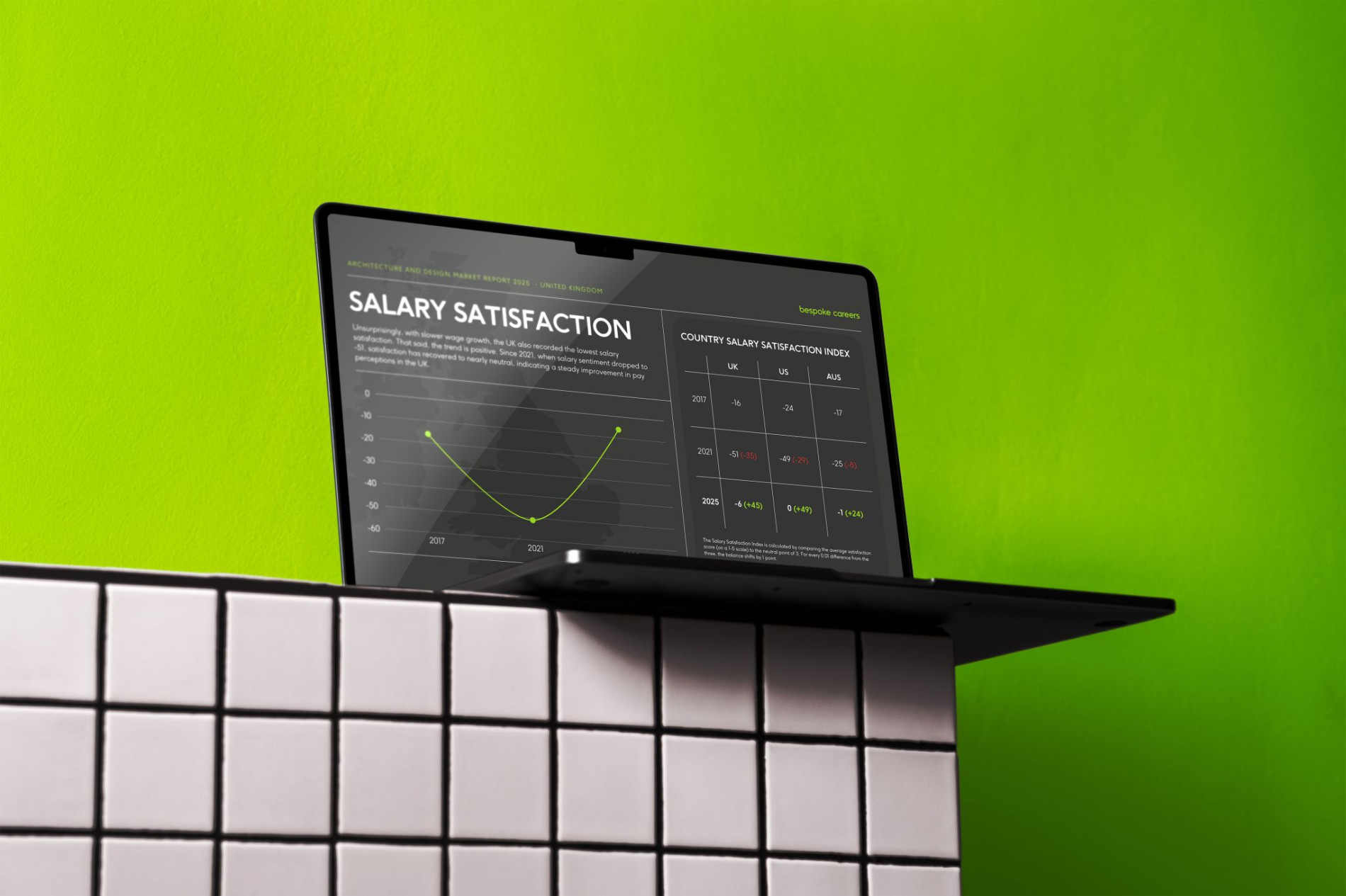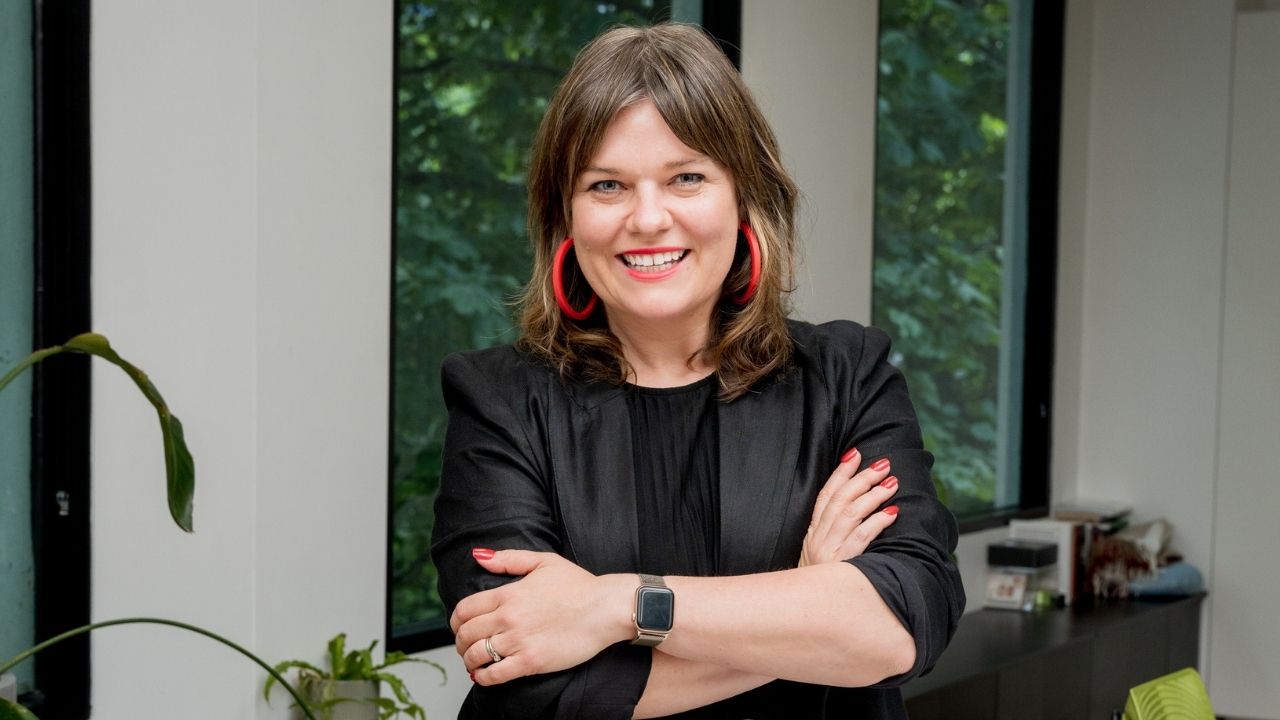
Australia leads on wellbeing, the US on pay. Where does that leave the UK?
A new report by Bespoke Careers reveals the UK architecture and design industry is showing signs of recovery, but still lags behind international peers on several key metrics.
The UK architecture and design profession is regaining momentum after a protracted period of economic uncertainty, according to the newly released 2025 Architecture and Design Market Report by Bespoke Careers.
The findings reflect an emerging optimism, set against a backdrop of slow salary growth, shifting work preferences and workplace policies, and persistent gaps in wellbeing and leadership diversity. While progress is visible, the UK continues to trail Australia and the United States in several key areas.
As Lindsay Urquhart, CEO & Founder of Bespoke Careers says:
“Right now, the momentum is shifting in a big way. As the market stabilises, practices are finding opportunities to grow and attract talent. For the first time in a long time, I’m feeling excited for the year ahead!”
Money still talks, but work-life balance speaks louder
One of the most marked shifts in the report is what motivates people to change jobs. In 2018, salary topped the list. In 2025, it ranks fifth. Today, professionals are more likely to move for better work-life balance, greater flexibility, clearer career progression, or a healthier organisational culture.
This shift reflects deeper changes in how architecture and design professionals view their careers post-pandemic. It also challenges traditional hiring strategies, particularly in firms that continue to rely on salary as their primary bargaining tool.
“Of course, we still need to pay competitively but its as important to create environments where our people can deliver their best work without sacrificing the lives they want to lead outside of it.”
– Jimmy Bent, Managing Director, Bespoke Careers
A return to the office
One in five UK practices (21%) have increased in-office attendance expectations over the past year, raising average office presence to 3.4 days per week. This remains higher than the 2.8 days preferred by employees, suggesting a growing gap between employer demands and individual expectations.
Across the UK, many employers have long wanted to bring staff back in more regularly, but only now feel confident enough to act. This shift comes as the market moves away from a candidate-driven environment, giving firms more leverage to set terms. The tension is particularly evident among younger employees, many of whom have only ever known remote or hybrid models.
Two-thirds of firms still offer some form of hybrid working, showing that pandemic-era flexibility has staying power. While some practices frame office time as key to collaboration and development, the data suggests a careful balance is needed.
The UK remains the most flexible of the three surveyed markets, with average required attendance 4% lower than in the US and 13% lower than in Australia. But as mandates rise, firms risk narrowing their hiring prospects as the talent pool have come to expect autonomy.
“One in five practices increased office days over the past year, bringing the split of full-time office workers to nearly half. The flexible workplace is here to stay, but employers are reaffirming office-culture as the norm.”
– Laura Toolan, Senior Associate, Bespoke Careers
Salary satisfaction rises significantly but fails to keep pace with global peers
UK salary growth averaged 4.66% over the past year, marginally below the 5.14% and 4.99% growth reported in both Australia and the US respectively. The gap is small on paper but more pronounced in context: London’s high cost of living, compounded by economic aftershocks from Brexit and inflation, means that modest salary increases stretch less far in real terms.
That said, salary satisfaction has improved dramatically. Since the low point in 2021, the UK has seen a 45-point or 18% increase in how professionals perceive their pay. The Salary Satisfaction Index in the UK now sits at -6, behind Australia (-1) and the US (0).
The data suggests that while compensation is still a pressure point, many feel less undervalued than in previous years.
Workplace wellbeing remains a weak spot
The UK continues to lag behind Australia and the US when it comes to workplace wellbeing, however all three surveyed regions report positive scores. The Wellbeing Index was at +16 in the UK, behind the US (+18) and Australia (+20).
This is despite making significant strides in flexible working. British professionals report lower levels of satisfaction with emotional and psychological support at work, with wellbeing initiatives often seen as inconsistent or reactive.
The findings raise questions about how deeply cultural change has taken root within UK practices. While structural adaptations such as hybrid working have become commonplace, genuine investment in employee wellbeing appears less embedded.
Progress on gender equity, but leadership gap persists
The UK reports the lowest gender pay gap among the three markets surveyed, at 7.3%. This equates to a median difference of around £3,500 per year. The figure is the result of steady improvement over recent years and reflects growing transparency around pay.
Bespoke Careers’ salary guide has contributed to this shift, providing clearer benchmarks and helping both employers and employees navigate pay parity discussions with greater confidence.
Women now represent 39% of leadership roles in UK architecture and design practices. While this marks a continuation of incremental progress, it falls short of proportional representation. Leadership remains skewed, and the pace of change remains slow. The link between diverse leadership and organisational performance is well established, yet many firms still struggle to translate intent into action.
Download the full report


Looking to hire top talent
 or advance your career? Let's talk.
or advance your career? Let's talk.
We connect exceptional firms with talented professionals.
Whether you're looking to hire or explore new career opportunities, let’s discuss how we can help you achieve your goals—get in touch today.
Related Posts

63% of hiring managers report a talent shortage in the UK – which was the highest of the three nations surveyed by Bespoke Careers.


